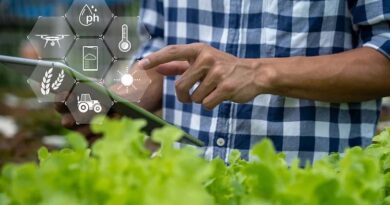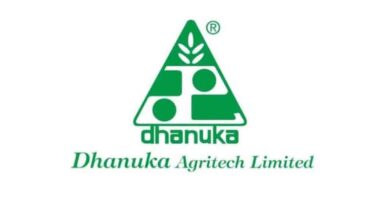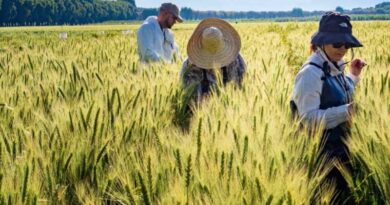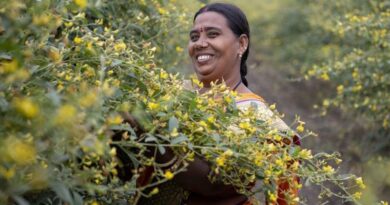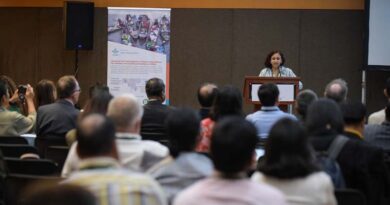AgriTech accelerates agricultural transformation for progressive and sustainable future, says GlobalData
22 June 2022, USA: The demand for more food to feed the world is escalating because of population growth and climate unpredictability. As a result, top agriculture companies are using AgriTech to optimize farming and transform the agricultural economy for a progressive and sustainable future, reveals GlobalData, a leading data and analytics company.
Top AgriTech companies are using notable technologies such as big data, robotics, drones, and artificial intelligence (AI) for faster planting, crop growth in any environment, and better harvesting.
Kiran Raj, Practice Head at GlobalData, comments: “Automation in agriculture eliminates the need for manual labor using hardware and software platforms to increase the overall food production and minimize quality loss. Innovative areas in agriculture such as digital phenotyping, genomics, molecular techniques, and smart greenhouses are gaining momentum.”
Vaibhav Gundre, Senior Consultant at GlobalData, comments: “Exploring new varieties and discovering novel genetic features using innovative agricultural concepts are seen as a growing trend. The combination of technologies such as sensors, computer vision, AI, and human-machine interface enables the prediction of crop yield and performance as well as performing weed and pest control processes.”
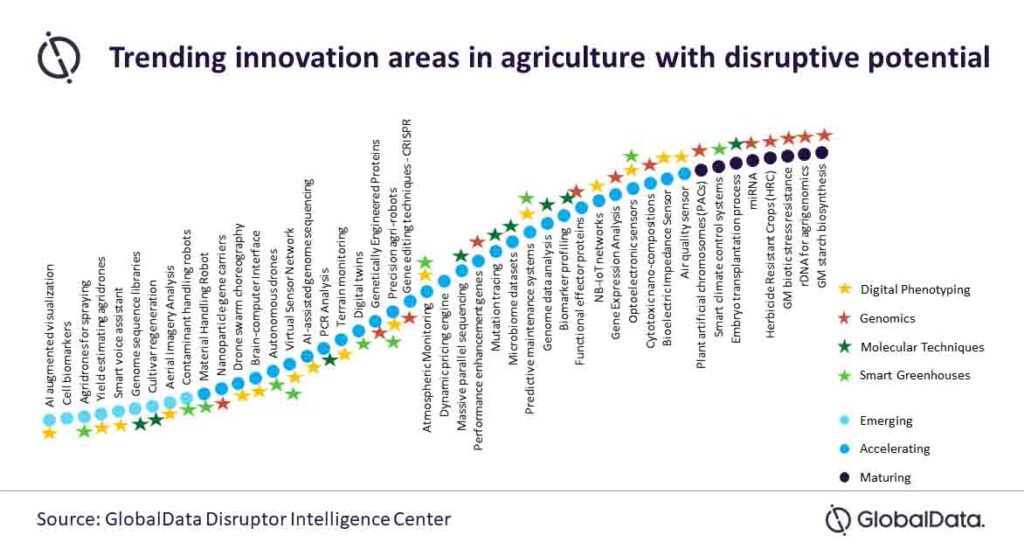
GlobalData’s Disruptor Intelligence Center highlights news mentions, company filings, job hirings, patent filings, and innovations among the leading agriculture companies to implement various emerging, accelerating, and maturing agricultural technologies.
Digital phenotyping
Digital phenotyping has expanded the scope of technology in agriculture with an increasing number of use cases in plant breeding, plant stress reduction, weed protection, and pesticide management. New technology development and product innovations such as tractor sensors, cameras, and autonomous aerial vehicles are increasingly found in company filings. Most agricultural companies seek experts in multiple digital phenotyping workflows which handle technologies such as computer vision, AI, and human-machine interfaces.
Genomics
Hunger and undernutrition are the primary drivers to design genomics tools. Advancements in technology can result in cultivating crops that are resilient to climate change, including plants with better biotic and abiotic stress tolerance. Gene-editing techniques such as CRISPR-Cas 9 are prominent in news publications with both agricultural companies and universities making developments in the space to create new crop traits. CRISPR and gene editing-related patent filings grew at a 30% compound annual growth rate (CAGR) between 2019-2021.
Molecular techniques
Isolating, cloning, and transferring genes from a variety of biological sources into plant genomes can open new avenues in agriculture. Molecular techniques such as DNA sequencing and genotyping modify plant varieties to discover new variants and explore resistance to biotic and abiotic stresses. Innovative startups focus on better plant breeds using the combination of DNA sequencing with digitalization. Several companies, in their filings, highlight the role of polymerase chain reaction (PCR) genotyping and high-throughput DNA sequencing in seed generation to obtain suitable desirable traits.
Smart greenhouses
Smart greenhouse production practices mitigate the impact of climate change in protected cultivation. IoT-based greenhouse automation has been increasingly profiled in news publications. AgriTech companies develop solutions for plant growth monitoring to minimize human intervention. Smart greenhouses require digitalization to operate without human intervention. Companies are recruiting automation specialists in the field of data management and robotics, as well as farming experts to track crop health.
Gundre concludes: “The future holds attractive advancements to boost yield and minimize produce loss. The use of tools such as massive parallel sequencing and biomarker pool can help increase the nutritional value in seeds to optimize seed protein. The use of AR and VR techniques could result in marker-based, markerless, and dynamic or complex augmentation to monitor crops as well as map crop health in a greenhouse environment.”
Also Read: Solis Yanmar to Launch 3 New Models



